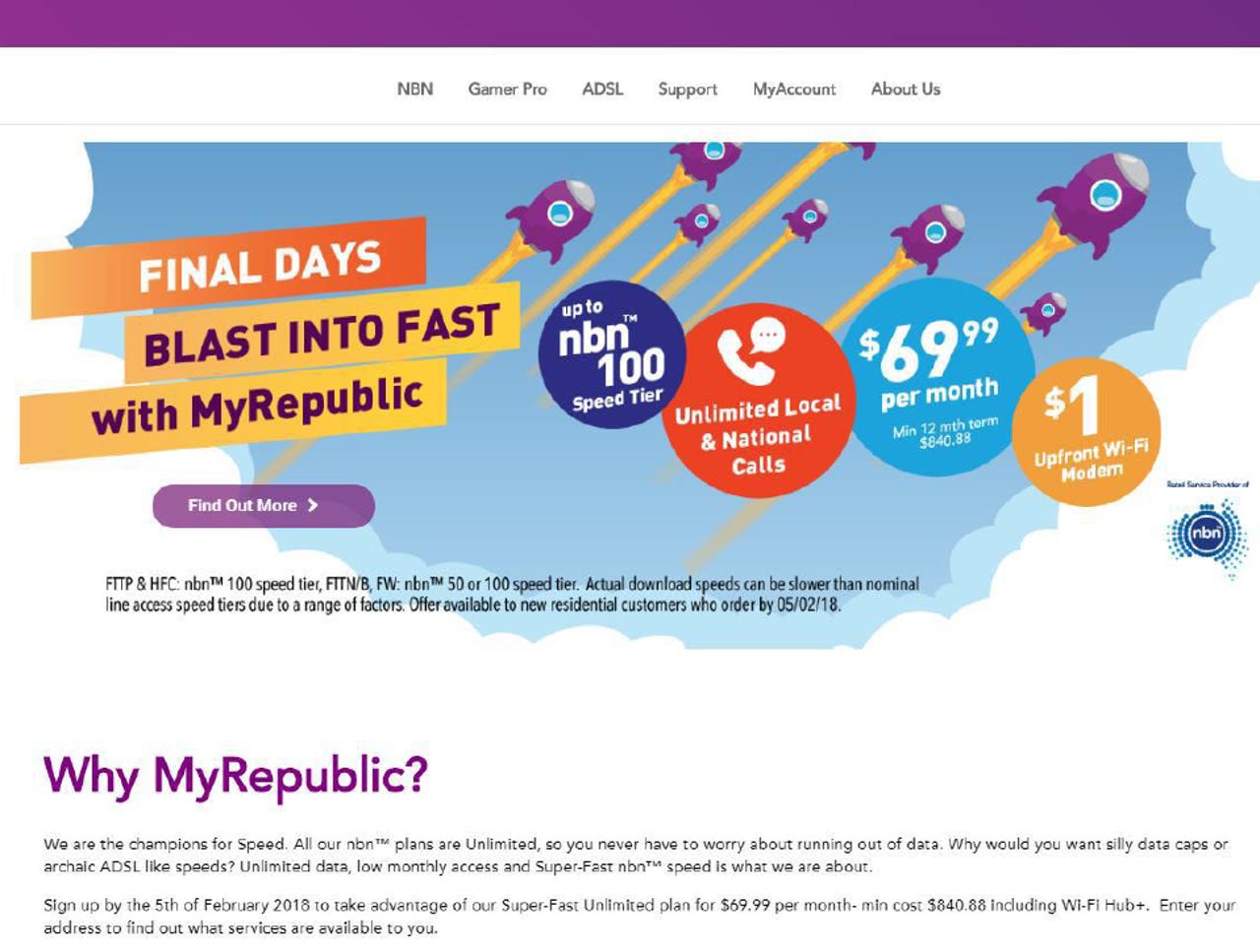MyRepublic pays AU$25k NBN speed claims penalty


The Australian Competition and Consumer Commission (ACCC) has announced that MyRepublic has been fined AU$25,200 for allegedly making false or misleading representations about its National Broadband Network (NBN) service performance.
The ACCC had issued MyRepublic with two infringement notices, saying that between December 2017 and April 2018, the retailer marketed its NBN services on its website with the statements "up to NBN 100 speed tier" and "NBN 50 speed tier".
According to the ACCC, MyRepublic's fine print disclaimers were "ineffective" due to their lack of clear information and prominence.
"We were concerned that MyRepublic's use of the NBN speed tiers misled consumers to believe they would get broadband speeds of, or close to, 100Mbps and 50Mbps during all or almost all of the time, when that wasn't the case," ACCC Commissioner Sarah Court said on Monday morning.
"NBN speed tiers indicate the maximum performance of a broadband service, but a number of factors, including congestion during busy periods, affects the actual speeds consumers will experience.
"When choosing between broadband services, consumers need accurate information about the performance they should expect, particularly during busy periods. We've been very clear with broadband providers about this and reference to the NBN speed tiers alone is not sufficient."
MyRepublic had made a point of launching its NBN services at the highest speeds possible back in late 2016, as well as undertaking a 1Gbps trial in Wollongong during 2017 in an effort to prove to NBN that customers want to use such speeds and capacity.
Charging AU$129 per month for the gigabit-speed service, MyRepublic Australia MD Nicholas Demos said the company lost money by providing it to customers.
"We're not selling it anymore," Demos said in December last year, explaining that the trial was just to show how popular it would be.
MyRepublic CEO Malcolm Rodrigues told ZDNet that MyRepublic offers gigabit services in Singapore and in New Zealand, saying the company would love to be able to afford this everywhere, but "NBN is a bit more politically sensitive".
Rodrigues added that he didn't understand why the Australian government had "built this beautiful highway and then said only horses and carriages can use it".
The company's fine came almost a year after the ACCC released its industry guidance on NBN speed claims, which said providers should package and advertise their fixed-line services along the lines of evening peak speeds.
In March, the ACCC published its first fixed-line broadband speed monitoring report that NBN retailers are delivering up to 90 percent of their speed tier promises during peak hours, with Telstra, Optus, TPG, and iiNet delivering between 80 and 90 percent of their speeds at all times, including the busy hours of between 7pm and 11pm.
The results "reflect significant and recent changes in the market", ACCC Chair Rod Sims said at the time, including its speed advertising guidance and NBN's CVC discounts.
Any underperforming services were more likely to have been impacted by "limitations" in the network, the ACCC said, rather than by congestion or a lack of CVC provisioning by RSPs.
However, the ACCC speed monitoring report had followed the consumer watchdog forcing Telstra, Optus, TPG, iiNet, Internode, Dodo, iPrimus, and Commander to compensate tens of thousands of customers for not providing them with the NBN speeds they were paying for.
Outgoing NBN CEO Bill Morrow had previously criticised retailers for cutting corners by focusing on pricing rather than speeds or quality of service after he revealed that the average bit rate per user was around 1Mbps, while RSPs including MyRepublic, along with Vocus, Vodafone, and Macquarie Telecom, argued that the only reason retailers are not offering gigabit speeds is the CVC pricing structure.
NBN in April again attempted to push speeds higher with new pricing, launching its new wholesale pricing options next month after several months of consulting with industry, in an effort to enable retail service providers to sell higher-speed plans while reducing congestion.
Recent NBN Coverage
- TIO recommends NBN retailers stop losing phone numbers
- NBN: There were more faults on fibre than satellite
- NBN introduces virtual access to POIs
- NBN changes to combat fixed-wireless congestion
- Decimal points are hard: NBN says regional rollout almost complete
- Software automation policy guidelines (Tech Pro Research)
- MacTel signs AU$100m deal for NBN business services
- Vodafone launches NBN Wi-Fi booster and new plans
- Fibre to the curb: How NBN is delivering its new network
- Labor to provide 'NBN service guarantee' if elected